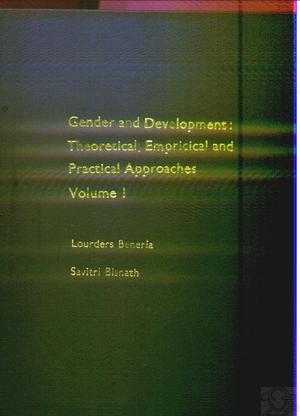Gender and Development:Theoretical, Empirical And Prectical Approaches Volume I
İÇİNDEKİLERContents Acknowledgements Introduction Lourdes Beneria PART I ECONOMIC DEVELOPMENT AND GENDER 1. Ingrid Palmer (1977), 'Rural Women and the Basic-Needs Approach to Development', International Labour Review,115 (1), January-February, 97-107 2. Lourdes Benerfa and Gita Sen (1982), 'Class and Gender Inequalities and Women's Role in Economic Development -Theoretical and Practical Implications', Feminist Studies, 8(1), Spring, 157-76 3. Nancy Folbre (1986), 'Cleaning House: New Perspectives on Households and Economic Development', Journal of Development Economics, 22 (1), June, 5-40 4. Irene Tinker (1990), The Making of a Field: Advocates, Practitioners and Scholars', in Irene Tinker (ed.), Persistent Inequalities: Women and World Development, Chapter 3, New York: Oxford University Press, 27-53, bibliography 5. Lourdes Beneria (1995), 'Toward a Greater Integration of Gender in Economies', World Development, 23 (11), November, 1839-50 6. Diane Elson (1999),'Theories of Development',in Janice Peterson and Margaret Lewis (eds), The Elgar Companion to Feminist Economics, Cheltenham: Edward Elgar, 95-107 PART II METHODOLOGICAL APPROACHES 7. Caroline O.N. Moser (1989), 'Gender Planning in the Third World: Meeting Practical and Strategic Gender Needs',World Development, 17 (11), November, 1799-825 8. NaiLa KaBeer (1992), 'Evaluating Cost-Benefit Analysis as a Tool for Gender Planning', Development and Change, 23 (2), April, 115-39 9. Diane Elson (1993), 'Gender-aware Analysis and Development Economies', Journal of International Development, 5 (2), March-April, 237-47 10. kalpana BaRdhan and Stephan Klasen (1999), 'UNDP's Gender-Related Indices: A Critical Review', World Development, 27 (6), June, 985-1010PART III ACCOUNTING FOR WOMEN'S WORK 11. Ruth B. Dixon (1982),'Women in Agriculture: Counting the Labor Force in Developing Countries', Population and Development Review, 8 (3), September, 539-66 12. Lourdes Beneria (1999), The Enduring Debate over Unpaid Labour', International Labour Review, 138 (3), 287-309 13. Maria Sagrario Floro (1995),'Women's Well-Being, Poverty, and Work Intensity', Feminist Economics, 1 (3), Fall, 1-25 14. Duncan Ironmonger (1996),'Counting Outputs, Capital Inputs and Caring Labor: Estimating Gross Household Product', Feminist Economics, 2 (3), Fall, 37-64 PART IV FAMILIES AND HOUSEHOLDS 15. Amartya Sen (1983), 'Economics and the Family', Asian Development Review, 1(2), 14-26 16. Nancy Folbre (1988), The Black Four of Hearts: Toward a New Paradigm of Household Economies', in Daisy Dwyer and Judith Bruce (eds), A Home Divided: Women and Income in the Third World, Stanford: Stanford University Press, 248-62, references 17. Nahid Aslanbeigui and Gale Summerfield (1989), 'Impact of the Responsibility System on Women in Rural China: An Application of Sen's Theory of Entitlements', World Development, 17 (3), March, 343-50 18. Diane L. Wolf (1990), 'Daughters, Decisions and Domination: An Empirical and Conceptual Critique of Household Strategies', Development and Change, 21 (1), January, 43-74 19. Elizabeth Katz (1991), 'Breaking the Myth of Harmony: Theoretical and Methodological Guidelines to the Study of Rural Third World Households', Review of Radical Political Economics, 23 (3 & 4), Fall/Winter, 37-56 20. Jeanne Koopman (1991), 'Neoclassical Household Models and Modes of Household Production: Problems in the Analysis of African Agricultural Households', Review of Radical Political Economics, 23 (3 & 4), Fall/Winter, 148-73 21. Bina Agarwal (1997), ' "Bargaining" and Gender Relations: Within and Beyond the Household', Feminist Economics, , 3(1)Spring, 1-51 PART V PROJECT IMPLEMENTATION AND EMPOWERMENT STRATEGIES 22. Mayra Buvinic (1986), 'Projects for Women in the Third World: Explaining Their Misbehavior', World Development, 14 (5), May, 653-64 23. Ela Bhatt (1989), Toward Empowerment',World Development, 17 (7), July, 1059-65 24. Sally Baden and Anne Marie Goetz (1998), 'Who Needs [Sex] When You Can Have [Gender ]?:Conflicting Discourses on Gender at Beijing', in Cecile Jackson and Ruth Pearson (eds), Feminist Visions of Development: Gender, Analysis and Policy, Chapter 1, London and New York: Routledge, 19-38 25. Naila Kabeer (1999), 'Resources, Agency, Achievements: Reflections on the Measurement of Women's Empowerment', Development and Change, 30 (3), July, 435-64 Name Index    |



